| Listing 1 - 10 of 17 | << page >> |
Sort by
|
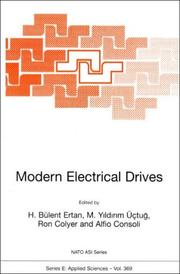
ISBN: 0792363760 9048154898 9401593876 Year: 2000 Publisher: Dordrecht ; Boston ; London Brussels Kluwer Academic Publishers NATO Scientific Affairs Division
Abstract | Keywords | Export | Availability | Bookmark
 Loading...
Loading...Choose an application
- Reference Manager
- EndNote
- RefWorks (Direct export to RefWorks)
Electrical drives lie at the heart of most industrial processes and make a major contribution to the comfort and high quality products we all take for granted. They provide the controller power needed at all levels, from megawatts in cement production to milliwatts in wrist watches. Other examples are legion, from the domestic kitchen to public utilities. The modern electrical drive is a complex item, comprising a controller, a static converter and an electrical motor. Some can be programmed by the user. Some can communicate with other drives. Semiconductor switches have improved, intelligent power modules have been introduced, all of which means that control techniques can be used now that were unimaginable a decade ago. Nor has the motor side stood still: high-energy permanent magnets, semiconductor switched reluctance motors, silicon micromotor technology, and soft magnetic materials produced by powder technology are all revolutionising the industry. But the electric drive is an enabling technology, so the revolution is rippling throughout the whole of industry.
#TELE:ELEN --- Electric driving --- Electric machinery --- Electric power --- Power transmission --- Electrical engineering. --- System theory. --- Electrical Engineering. --- Systems Theory, Control. --- Systems, Theory of --- Systems science --- Science --- Electric engineering --- Engineering --- Philosophy
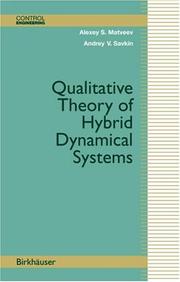
ISBN: 0817641416 1461271142 1461213649 9780817641412 Year: 2000 Publisher: Boston: Birkhäuser,
Abstract | Keywords | Export | Availability | Bookmark
 Loading...
Loading...Choose an application
- Reference Manager
- EndNote
- RefWorks (Direct export to RefWorks)
Hybrid dynamical systems, both continuous and discrete dynamics and variables, have attracted considerable interest recently. This emerging area is found at the interface of control theory and computer engineering, focusing on the analogue and digital aspects of systems and devices. They are essential for advances in modern digital- controller technology. "Qualitative Theory of Hybrid Dynamical Systems" provides a thorough development and systematic presentation of the foundations and framework for hybrid dynamical systems. The presentation offers an accessible, but precise, development of the mathematical models, conditions for existence of limit cycles, and criteria of their stability. The book largely concentrates on the case of discretely controlled continuous-time systems and their relevance for modeling aspects of flexible manufacturing systems and dynamically routed queuing networks. Features and topics: *differential automata*development and use of the concept "cyclic linear differential automata" (CLDA)*switched single-server flow networks coverage*application to specific models of manufacturing systems and queuing networks*select collection of open problems for the subject*self-contained presentation of topics, with the necessary background This new book is an excellent resource for the study and analysis of hybrid dynamical systems used in systems and control engineering. Researchers, postgraduates and professionals in control engineering and computer engineering will find the book an up-to-date development of the relevant new concepts and tools.
Ordinary differential equations --- Electronic controllers --- Digital control systems --- Analog electronic systems --- Applied mathematics. --- Engineering mathematics. --- System theory. --- Control engineering. --- Robotics. --- Mechatronics. --- Applications of Mathematics. --- Systems Theory, Control. --- Control, Robotics, Mechatronics. --- Mechanical engineering --- Microelectronics --- Microelectromechanical systems --- Automation --- Machine theory --- Control engineering --- Control equipment --- Control theory --- Engineering instruments --- Programmable controllers --- Systems, Theory of --- Systems science --- Science --- Engineering --- Engineering analysis --- Mathematical analysis --- Philosophy --- Mathematics

ISBN: 9780822324720 0822324369 0822324725 082238065X 128306202X Year: 2000 Publisher: Durham, N.C. Duke University Press
Abstract | Keywords | Export | Availability | Bookmark
 Loading...
Loading...Choose an application
- Reference Manager
- EndNote
- RefWorks (Direct export to RefWorks)
Collection of essays by Susan Oyama looking at the implications of developmental systems approach for evolutionary theory, specifically for nature-nurture oppositions, ideas of essential human nature, and the limits of human agency and possibility.
Philosophy of science --- Developmental psychology --- Genetic psychology --- System theory --- Biological Evolution --- Genetic Variation --- Psychology --- Human Development --- Behavioral Sciences --- Biological Processes --- Genetic Processes --- Genetic Phenomena --- Growth and Development --- Behavior and Behavior Mechanisms --- Psychiatry and Psychology --- Biological Phenomena --- Physiological Processes --- Behavioral Disciplines and Activities --- Phenomena and Processes --- Physiological Phenomena --- Social Sciences --- Developmental psychology. --- Genetic psychology. --- System theory. --- Systems, Theory of --- Systems science --- Development (Psychology) --- Science --- Human genetics --- Developmental psychobiology --- Life cycle, Human --- Philosophy
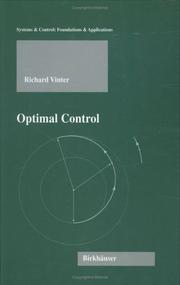
ISBN: 0817640754 0817649905 9786612982583 0817680861 1282982583 9780817640750 Year: 2000 Publisher: Boston: Birkhäuser,
Abstract | Keywords | Export | Availability | Bookmark
 Loading...
Loading...Choose an application
- Reference Manager
- EndNote
- RefWorks (Direct export to RefWorks)
Optimal Control brings together many of the important advances in 'nonsmooth' optimal control over the last several decades concerning necessary conditions, minimizer regularity, and global optimality conditions associated with the Hamilton–Jacobi equation. The book is largely self-contained and incorporates numerous simplifications and unifying features for the subject’s key concepts and foundations. Features and Topics: * a comprehensive overview is provided for specialists and nonspecialists * authoritative, coherent, and accessible coverage of the role of nonsmooth analysis in investigating minimizing curves for optimal control * chapter coverage of dynamic programming and the regularity of minimizers * explains the necessary conditions for nonconvex problems This book is an excellent presentation of the foundations and applications of nonsmooth optimal control for postgraduates, researchers, and professionals in systems, control, optimization, and applied mathematics. ----- Each chapter contains a well-written introduction and notes. They include the author's deep insights on the subject matter and provide historical comments and guidance to related literature. This book may well become an important milestone in the literature of optimal control.—Mathematical Reviews This remarkable book presents Optimal Control seen as a natural development of Calculus of Variations so as to deal with the control of engineering devices. ... Thanks to a great effort to be self-contained, it renders accessibly the subject to a wide audience. Therefore, it is recommended to all researchers and professionals interested in Optimal Control and its engineering and economic applications. It can serve as an excellent textbook for graduate courses in Optimal Control (with special emphasis on Nonsmooth Analysis). —Automatica The book may be an essential resource for potential readers, experts in control and optimization, as well as postgraduates and applied mathematicians, and it will be valued for its accessibility and clear exposition.—Applications of Mathematics.
Automatic control --- Control theory --- Mathematical models --- Mathematics. --- System theory. --- Calculus of variations. --- Control engineering. --- Systems Theory, Control. --- Control. --- Calculus of Variations and Optimal Control; Optimization. --- Systems theory. --- Mathematical optimization. --- Control and Systems Theory. --- Optimization (Mathematics) --- Optimization techniques --- Optimization theory --- Systems optimization --- Mathematical analysis --- Maxima and minima --- Operations research --- Simulation methods --- System analysis --- Systems, Theory of --- Systems science --- Science --- Isoperimetrical problems --- Variations, Calculus of --- Control engineering --- Control equipment --- Engineering instruments --- Automation --- Programmable controllers --- Philosophy --- Automatic control - Mathematical models
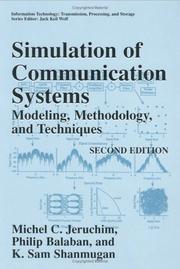
ISBN: 0306462672 1280205407 9780306469715 9786610205400 0306469715 Year: 2000 Publisher: New York : Kluwer Academic Publishers,
Abstract | Keywords | Export | Availability | Bookmark
 Loading...
Loading...Choose an application
- Reference Manager
- EndNote
- RefWorks (Direct export to RefWorks)
Since the first edition of this book was published seven years ago, the field of modeling and simulation of communication systems has grown and matured in many ways, and the use of simulation as a day-to-day tool is now even more common practice. With the current interest in digital mobile communications, a primary area of application of modeling and simulation is now in wireless systems of a different flavor from the `traditional' ones. This second edition represents a substantial revision of the first, partly to accommodate the new applications that have arisen. New chapters include material on modeling and simulation of nonlinear systems, with a complementary section on related measurement techniques, channel modeling and three new case studies; a consolidated set of problems is provided at the end of the book.
654.1 --- Telecommunication systems --- -654.1 Telegraphy. Telephony. Radio. Television --- Telegraphy. Telephony. Radio. Television --- Communication systems --- Communications systems --- Systems, Communication --- Computer simulation --- Systèmes de télécommunications --- Simulation par ordinateur --- EPUB-LIV-FT SPRINGER-B --- Telecommunication systems -- Computer simulation. --- Engineering. --- System theory. --- Electrical engineering. --- Electrical Engineering. --- Systems Theory, Control. --- 654.1 Telegraphy. Telephony. Radio. Television --- Electronic systems --- Telecommunication --- Telecommunication. --- Computer simulation. --- Computer engineering. --- Systems theory. --- Systems, Theory of --- Systems science --- Science --- Electric engineering --- Engineering --- Philosophy --- Telecommunication systems.

ISBN: 3540669051 3642570143 Year: 2000 Publisher: Berlin Springer
Abstract | Keywords | Export | Availability | Bookmark
 Loading...
Loading...Choose an application
- Reference Manager
- EndNote
- RefWorks (Direct export to RefWorks)
The 9th Belgian-French-German Conference on Optimization has been held in Namur (Belgium) on September 7-11, 1998. This volume is a collection of papers presented at this Conference. Originally, this Conference was a French-German Conference but this year, in accordance with the organizers' wishes, a third country, Belgium, has joined the founding members of the Conference. Hence the name: Belgian French-German Conference on Optimization. Since the very beginning, the purpose of these Conferences has been to bring together researchers working in the area of Optimization and partic ularly to encourage young researchers to present their work. Most of the participants come from the organizing countries. However the general ten dancy is to invite outside researchers to attend the meeting. So this year, among the 101 participants at this Conference, twenty researchers came from other countries. The general theme of the Conference is everything that concerns the area of Optimization without specification of particular topics. So theoretical as pects of Optimization, in addition to applications and algorithms of Opti mization, will be developed. However, and this point was very important for the organizers, the Conference must retain its convivial character. No more than two parallel sessions are organized. This would allow useful contacts between researchers to be promoted. The editors express their sincere thanks to all those who took part in this Conference. Their invaluable discussions have made this volume possible.
Mathematical statistics --- Mathematical optimization --- Civil & Environmental Engineering --- Engineering & Applied Sciences --- Operations Research --- AA / International- internationaal --- 305.976 --- NBB congres --- Algoritmen. Optimisatie. --- Conferences - Meetings --- Algoritmen. Optimisatie --- Operations research. --- Decision making. --- Calculus of variations. --- System theory. --- Operations Research/Decision Theory. --- Calculus of Variations and Optimal Control; Optimization. --- Systems Theory, Control. --- Systems, Theory of --- Systems science --- Science --- Isoperimetrical problems --- Variations, Calculus of --- Maxima and minima --- Deciding --- Decision (Psychology) --- Decision analysis --- Decision processes --- Making decisions --- Management --- Management decisions --- Choice (Psychology) --- Problem solving --- Operational analysis --- Operational research --- Industrial engineering --- Management science --- Research --- System theory --- Philosophy --- Decision making --- Programmation (mathématiques)
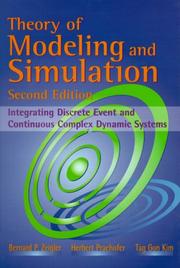
ISBN: 0127784551 Year: 2000 Publisher: San Diego, Calif. Academic Press
Abstract | Keywords | Export | Availability | Bookmark
 Loading...
Loading...Choose an application
- Reference Manager
- EndNote
- RefWorks (Direct export to RefWorks)
Artificial intelligence. Robotics. Simulation. Graphics --- Computer simulation. --- System theory --- Simulation par ordinateur --- Théorie des systèmes --- Computer simulation --- 681.3*I6 --- dess (differential equation system specification) --- devs (discrete event system specifications) --- dtss (discrete time system specification) --- simulatie --- systeemtheorie --- 003.3 --- Systems, Theory of --- Systems science --- Science --- Computer modeling --- Computer models --- Modeling, Computer --- Models, Computer --- Simulation, Computer --- Electromechanical analogies --- Mathematical models --- Simulation methods --- Model-integrated computing --- Simulation and modeling (Computing methodologies)--See also {681.3*G3} --- Philosophy --- System theory. --- 681.3*I6 Simulation and modeling (Computing methodologies)--See also {681.3*G3}
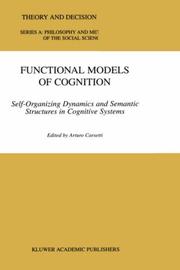
ISBN: 0792360729 9048153603 9401596204 Year: 2000 Volume: 27 Publisher: Dordrecht ; Boston ; London Kluwer academic publishers
Abstract | Keywords | Export | Availability | Bookmark
 Loading...
Loading...Choose an application
- Reference Manager
- EndNote
- RefWorks (Direct export to RefWorks)
Our ontology as well as our grammar are, as Quine affirms, ineliminable parts of our conceptual contribution to our theory of the world. It seems impossible to think of enti ties, individuals and events without specifying and constructing, in advance, a specific language that must be used in order to speak about these same entities. We really know only insofar as we regiment our system of the world in a consistent and adequate way. At the level of proper nouns and existence functions we have, for instance, a standard form of a regimented language whose complementary apparatus consists of predicates, variables, quantifiers and truth functions. If, for instance, the discoveries in the field of Quantum Mechanics should oblige us, in the future, to abandon the traditional logic of truth functions, the very notion of existence, as established until now, will be chal lenged. These considerations, as developed by Quine, introduce us to a conceptual perspective like the "internal realist" perspective advocated by Putnam whose principal aim is, for cer tain aspects, to link the philosophical approaches developed respectively by Quine and Wittgenstein. Actually, Putnam conservatively extends the approach to the problem of ref erence outlined by Quine: in his opinion, to talk of "facts" without specifying the language to be used is to talk of nothing.
Cognitie --- Cognitieve wetenschap --- Cognition --- Cognitive science --- Sciences cognitives --- Wetenschap [Cognitieve ] --- Cognition. --- Cognitive science. --- Cognitive psychology. --- System theory. --- Computers. --- Artificial intelligence. --- Epistemology. --- Cognitive Psychology. --- Systems Theory, Control. --- Theory of Computation. --- Artificial Intelligence. --- Epistemology --- Theory of knowledge --- Philosophy --- Psychology --- AI (Artificial intelligence) --- Artificial thinking --- Electronic brains --- Intellectronics --- Intelligence, Artificial --- Intelligent machines --- Machine intelligence --- Thinking, Artificial --- Bionics --- Digital computer simulation --- Electronic data processing --- Logic machines --- Machine theory --- Self-organizing systems --- Simulation methods --- Fifth generation computers --- Neural computers --- Automatic computers --- Automatic data processors --- Computer hardware --- Computing machines (Computers) --- Electronic calculating-machines --- Electronic computers --- Hardware, Computer --- Computer systems --- Cybernetics --- Calculators --- Cyberspace --- Systems, Theory of --- Systems science --- Science --- Psychology, Cognitive
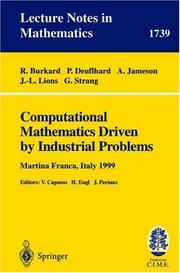
ISBN: 3540677828 3540449760 9783540677826 Year: 2000 Volume: 1739 Publisher: Berlin: Springer,
Abstract | Keywords | Export | Availability | Bookmark
 Loading...
Loading...Choose an application
- Reference Manager
- EndNote
- RefWorks (Direct export to RefWorks)
These lecture notes by very authoritative scientists survey recent advances of mathematics driven by industrial application showing not only how mathematics is applied to industry but also how mathematics has drawn benefit from interaction with real-word problems. The famous David Report underlines that innovative high technology depends crucially for its development on innovation in mathematics. The speakers include three recent presidents of ECMI, one of ECCOMAS (in Europe) and the president of SIAM.
Mathematical models --- Mathematics --- Industrial applications --- Congresses --- Mathematics - Industrial applications - Congresses. --- Computer science—Mathematics. --- Calculus of variations. --- Numerical analysis. --- System theory. --- Probabilities. --- Thermodynamics. --- Mathematics of Computing. --- Calculus of Variations and Optimal Control; Optimization. --- Numerical Analysis. --- Systems Theory, Control. --- Probability Theory and Stochastic Processes. --- Chemistry, Physical and theoretical --- Dynamics --- Mechanics --- Physics --- Heat --- Heat-engines --- Quantum theory --- Probability --- Statistical inference --- Combinations --- Chance --- Least squares --- Mathematical statistics --- Risk --- Systems, Theory of --- Systems science --- Science --- Mathematical analysis --- Isoperimetrical problems --- Variations, Calculus of --- Maxima and minima --- Philosophy --- Mathematical models - Congresses.
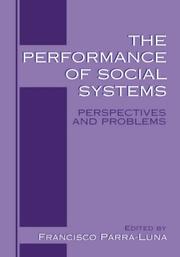
ISBN: 0306463091 1461369088 1461542510 Year: 2000 Publisher: New York (N.Y.) Kluwer
Abstract | Keywords | Export | Availability | Bookmark
 Loading...
Loading...Choose an application
- Reference Manager
- EndNote
- RefWorks (Direct export to RefWorks)
It can be said that the concept of performance of social systems is one of the most relevant, since all social systems - from the family, through the enterprise, to the Nation state - are only interesting in obtaining as high a performance as possible. The difficulties encountered when dealing with the concept of performance have been recognized and few books until now ventured to tackle the task, mainly because of the following three big problems: the lack of a theoretical-operational model; the lack of valid data; and the lack of computer facilities. Today these obstacles have been overcome and this is the first book based on different systemic perspectives (value theory, modelling, observation and quantification) which offers the possibility of defining and working out the concept. The book should be of great interest to sociologists, political scientists, economists, organizational theorists, managers and politicians.
Social systems --- Social values. --- System theory. --- Evaluation. --- -System theory --- Social values --- #SBIB:35H202 --- #SBIB:35H437 --- #SBIB:003.IO --- Values --- Systems, Theory of --- Systems science --- Science --- Sociology --- System theory --- Evaluation --- Overheidsmanagement: prestatiemanagement --- Beleidssectoren: sociale zekerheid --- Philosophy --- Business mathematics. --- Information technology. --- Business—Data processing. --- Management. --- Political science. --- Sociology. --- Business Mathematics. --- IT in Business. --- Political Science. --- Sociology, general. --- Social theory --- Social sciences --- Administration --- Civil government --- Commonwealth, The --- Government --- Political theory --- Political thought --- Politics --- Science, Political --- State, The --- Industrial relations --- Organization --- IT (Information technology) --- Technology --- Telematics --- Information superhighway --- Knowledge management --- Arithmetic, Commercial --- Business --- Business arithmetic --- Business math --- Commercial arithmetic --- Finance --- Mathematics
| Listing 1 - 10 of 17 | << page >> |
Sort by
|

 Search
Search Feedback
Feedback About UniCat
About UniCat  Help
Help News
News